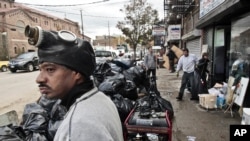NEW YORK —
In the aftermath of superstorm Sandy, New York city is dealing with water in tunnels, electrical conduits, and in the basements of major financial institutions.
On Tuesday, the Brooklyn Bridge was covered with bumper to bumper traffic. On the pedestrian deck above, thousands of pedestrians were keeping pace with the cars.
Due to a city-wide suspension of subway service, street vendor Dominic Raiano decided to walk from Brooklyn to Manhattan after waiting an hour for a bus.
“There’s no reason that there shouldn’t be shuttle bus service for the trainsm," he complained. "They do it on other times when trains are down. Why can’t they do it this time?”
New York State Governor, Andrew Cuomo is asking the public to be patient.
“There are significant challenges that we're facing, he explained, "and problems in many cases that we've never experienced before or not in our generation. So patience and tolerance will be appreciated."
Cuomo announced the resumption of limited subway service in parts of the city for Thursday, but not in Lower Manhattan.
Workers there are pumping water from flooded underground electrical conduits. The flooding as well as an explosion during the storm at a transformer station knocked out power to New York’s Financial District, a local hospital, and the city’s tallest apartment building, the new Beekman Tower designed by famous architect Frank Gehry.
Nathaniel Clay, who lives on the 70th floor, says the novelty of using the power outage to visit friends and neighbors is wearing off. The basement of Clay’s office in New York's Financial District is flooded. Subway stations in the area and some commuter tunnels also are flooded.
“At this point, I think a lot of people are getting stir-crazy, nad want to go back to their normal routines," he admitted.
At the request of the Federal Emergency Management Agency, the U.S. Army Corps of Engineers is helping the city remove water from places where Corps spokesperson Chris Gardner says it has never been.
“There are still tunnels and there are other areas in Lower Manhattan with large amount of water. We’re here to support efforts to unwater those as soon as possible and as soon as feasible," Gardner explained. "But there’s not really a timeline for that."
Gardner says the Corps of Engineers also is helping clean up tons of debris from New York waters to ensure the safety of local shipping, much of which has also been suspended.
On Tuesday, the Brooklyn Bridge was covered with bumper to bumper traffic. On the pedestrian deck above, thousands of pedestrians were keeping pace with the cars.
Due to a city-wide suspension of subway service, street vendor Dominic Raiano decided to walk from Brooklyn to Manhattan after waiting an hour for a bus.
“There’s no reason that there shouldn’t be shuttle bus service for the trainsm," he complained. "They do it on other times when trains are down. Why can’t they do it this time?”
New York State Governor, Andrew Cuomo is asking the public to be patient.
“There are significant challenges that we're facing, he explained, "and problems in many cases that we've never experienced before or not in our generation. So patience and tolerance will be appreciated."
Cuomo announced the resumption of limited subway service in parts of the city for Thursday, but not in Lower Manhattan.
Workers there are pumping water from flooded underground electrical conduits. The flooding as well as an explosion during the storm at a transformer station knocked out power to New York’s Financial District, a local hospital, and the city’s tallest apartment building, the new Beekman Tower designed by famous architect Frank Gehry.
Nathaniel Clay, who lives on the 70th floor, says the novelty of using the power outage to visit friends and neighbors is wearing off. The basement of Clay’s office in New York's Financial District is flooded. Subway stations in the area and some commuter tunnels also are flooded.
“At this point, I think a lot of people are getting stir-crazy, nad want to go back to their normal routines," he admitted.
At the request of the Federal Emergency Management Agency, the U.S. Army Corps of Engineers is helping the city remove water from places where Corps spokesperson Chris Gardner says it has never been.
“There are still tunnels and there are other areas in Lower Manhattan with large amount of water. We’re here to support efforts to unwater those as soon as possible and as soon as feasible," Gardner explained. "But there’s not really a timeline for that."
Gardner says the Corps of Engineers also is helping clean up tons of debris from New York waters to ensure the safety of local shipping, much of which has also been suspended.




